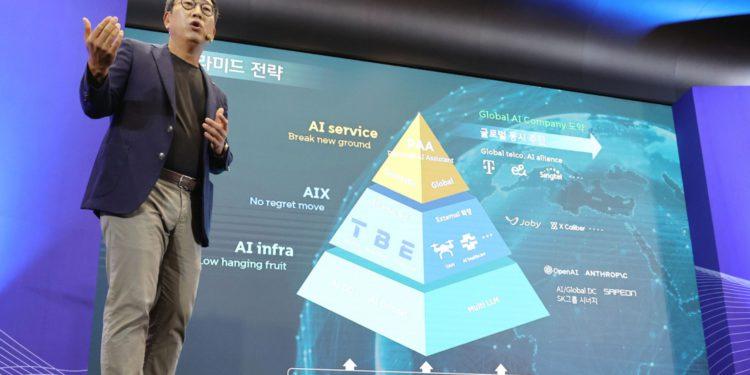South Korea’s SK Telecom (SKT) has unveiled its ‘AI Pyramid Strategy’ as it triples its investments in AI-related initiatives over the next five years, targeting a revenue of KRW 25 trillion.
Currently allocating around 12% of its investments to AI, based on figures from 2019 to 2023, SKT intends to increase this proportion to 33% between 2024 and 2028.
SK Telecom’s CEO, Ryu Young-sang, outlined the comprehensive ‘AI Pyramid Strategy,’ where he highlighted its goal of driving innovation across industries and society. The plan included daily life through three key elements: AI Infrastructure, AI Transformation (AIX), and AI Service. The new project is expected to help expand its presence in the AI landscape, building upon the 12% allocation over the past five years to reach the targeted 33% over the next half-decade.
“The AI gold rush is underway, and SK Telecom is taking the lead in embracing this transformative era. As telecom operators lack legacy systems, the AI revolution presents a clear opportunity for us,” said the CEO. “We will innovate business models uniquely suited for telecom operators, enabling us to remain competitive in the market.”
The base layer of SK Telecom’s AI Pyramid is dedicated to AI Infrastructure, encompassing key elements like AI data centers, AI semiconductors, and multi-large language models (multi-LLMs). This foundational layer is pivotal to SKT’s comprehensive strategy.
SK Telecom plans to nearly double its existing capacity by 2030 to support its AI data center capacity. This expansion focuses on energy efficiency, utilizing innovative solutions such as liquid cooling systems and hydrogen fuel cells to enhance sustainability.
Spearheading the semiconductor innovation within SK Telecom’s AI strategy is Sapeon, the company’s dedicated AI semiconductor arm. Sapeon is set to introduce the X330, a next-generation inference AI chip, by the end of this year. This specialized chip is tailored for AI workloads and is poised to deliver approximately double the computational performance and 1.3 times the power efficiency of current offerings.
At the pinnacle of SK Telecom’s AI Pyramid stands the AI Service layer, characterized by the official launch of ‘A.’, an upcoming personal AI assistant. Beyond facilitating seamless connections, ‘A.’ will also offer a sleep management solution called ‘A. sleep.’ This feature will analyze sleep patterns to determine the optimal wake-up time, enhancing users’ mornings by starting their day in the best possible way.
Another intriguing offering is ‘A. music,’ which will leverage a generative customer prediction model to suggest songs that align with users’ musical preferences.
SK Telecom (SKT) is gearing up for a future driven by generative AI innovation, and its CEO, Ryu Young-sang, has emphasized the profound impact of this disruptive technology.
Ryu stated, “Destructive innovation triggered by generative AI is already creating new value in all areas of industry, society, and life.” With its AI Pyramid Strategy, SKT aims to strengthen its capabilities, collaborate with diverse partners, and intensify investments in AI-related resources.
This initiative stems from SKT’s global alliance formed in July, bringing together telecom giants such as Germany’s Deutsche Telekom, the United Arab Emirates’ e&, and Singapore’s Singtel to foster AI collaboration on a global scale.
As part of its global aspirations, SK Telecom plans to introduce a personal AI assistant roaming service designed to benefit approximately 1.2 billion telecom users across 45 countries.
More from Korea Tech Today:
- SK Telecom Introduces 40% Cost Savings for AWS Cloud Users
- Cue: Takes the Spotlight – Naver’s Beta Launch Set For AI-Driven Search
- 5G IoT Advancement: SK Telecom Introduces RedCap Technology
- Telco Giants Unite: SK Telecom and Global Partners Create a Platform for AI-Powered Business Models
- SK Telecom Faces Allegations of Headhunting Naver’s AI Professionals







